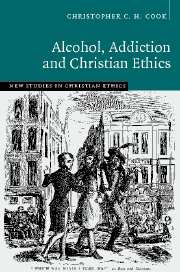Book contents
- Frontmatter
- Contents
- General editor's preface
- Preface
- 1 Alcohol, addiction and Christian ethics: introduction
- 2 An addiction in context: the use, misuse and harmful use of alcohol
- 3 Drunkenness as vice in the New Testament
- 4 Drunkenness as intemperance: Augustine, Aquinas, Luther and Whitefield
- 5 Temperance redefined: the nineteenth-century temperance movement
- 6 Addiction as sin and syndrome: the divided self
- 7 Alcohol, addiction and Christian ethics
- 8 Conclusions
- Bibliography
- Index of Bible references
- Index of names and subjects
1 - Alcohol, addiction and Christian ethics: introduction
Published online by Cambridge University Press: 22 September 2009
- Frontmatter
- Contents
- General editor's preface
- Preface
- 1 Alcohol, addiction and Christian ethics: introduction
- 2 An addiction in context: the use, misuse and harmful use of alcohol
- 3 Drunkenness as vice in the New Testament
- 4 Drunkenness as intemperance: Augustine, Aquinas, Luther and Whitefield
- 5 Temperance redefined: the nineteenth-century temperance movement
- 6 Addiction as sin and syndrome: the divided self
- 7 Alcohol, addiction and Christian ethics
- 8 Conclusions
- Bibliography
- Index of Bible references
- Index of names and subjects
Summary
Alcohol has many and contrasting associations. A glass of wine with a meal can symbolise love, friendship, relaxation and enjoyment of a special occasion. It can represent romance, coming of age, success, beginnings and endings, good news and good company. At a Christian Eucharist or Jewish Passover, where wine is also shared, thanks are given to God for divine salvation from all that enslaves, restricts and condemns. In drinking the wine, Christians participate with the first disciples in their last supper with Christ, and Jews participate with the ancient Hebrews in their exodus from enslavement in Egypt. But sadly, the sacredness and redemptiveness of these occasions contrasts with the associations of alcohol with drunken violence in our towns and cities, cirrhosis of the liver on our medical wards, debt in families, and death on our roads. It contrasts also, and more especially, with the enslavement that is alcoholism, or alcohol addiction.
In more purely statistical and objective terms, alcohol misuse is a contemporary social problem of enormous economic significance, which exacts a high toll of human suffering as a result of the social, psychological and medical harms to which it gives rise. Alcohol-related morbidity and mortality are high in most parts of the world, and in many developing nations alcohol consumption and its concomitant harms are on the increase.
- Type
- Chapter
- Information
- Alcohol, Addiction and Christian Ethics , pp. 1 - 8Publisher: Cambridge University PressPrint publication year: 2006



